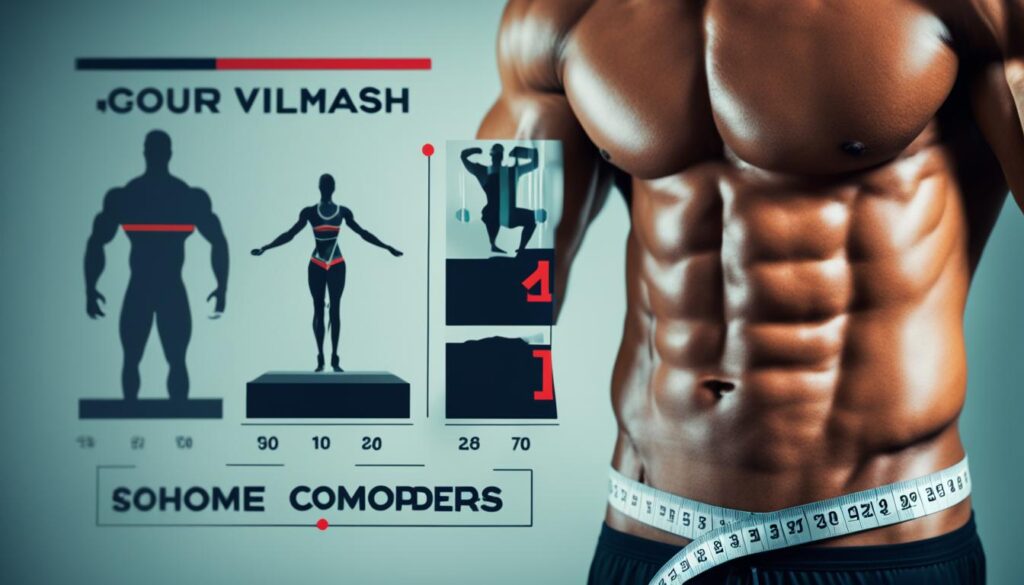I believe that a successful weight loss journey is not just about the numbers on the scale. It’s about embracing a healthy lifestyle, shifting our mindset, and focusing on non-scale victories that contribute to long-term success.
Stepping on the scale can often be tied to body image struggles, and it may not accurately reflect the progress made in other areas, such as improved fitness and overall health. Weighing ourselves regularly can lead to frustration and disappointment, especially during the early stages when changes may not be immediately visible.
Instead of fixating on the scale, let’s explore alternative ways to track progress and celebrate the non-scale victories that contribute to a sustainable weight loss journey. By shifting our focus and embracing a more holistic approach, we can cultivate body positivity, prioritize self-care, and achieve our long-term goals.
Key Takeaways:
- Ditch the scale and focus on non-scale victories for sustainable weight loss success.
- Embrace a healthy lifestyle and mindset shift.
- Track progress through different methods, such as progress tracking, body positivity, and self-care.
- Set long-term goals and celebrate small wins along the way.
- Remember that weight is just one measure of progress, and there are alternative markers, such as improved fitness and overall well-being.
The Pros and Cons of Weighing Yourself Regularly
Weighing yourself regularly can be a useful tool for those who have already achieved their weight loss goals and are focused on maintaining their progress. It provides a way to stay accountable and on track with their diet and exercise program. By keeping an eye on the numbers, individuals can make adjustments if they notice any significant weight fluctuations.
However, for those who are just starting their weight loss journey, the scale can be a double-edged sword. It can lead to feelings of frustration and disappointment, especially when changes in weight are not immediately evident. A number on the scale may not accurately reflect the progress made in other areas, such as improved fitness levels, increased energy, or enhanced overall well-being.
While tracking weight loss progress is important, it’s essential to remember that it’s not the only measure of success. Body image struggles and an unhealthy obsession with the scale can derail efforts to achieve a healthy lifestyle and positive body image. It’s crucial to establish a healthy mindset and find alternative ways to track progress that go beyond just the number on the scale.
Alternative Ways to Track Progress
Instead of solely relying on the scale, there are various alternative methods to measure and celebrate progress. Here are a few:
- Set Behavioral Goals: Instead of focusing on weight alone, set goals related to behavior changes. This could include exercising consistently, practicing mindful eating, or adopting other healthy habits. Achieving these goals can provide a sense of accomplishment and indicate progress, irrespective of any changes on the scale.
- Measure Improvements in Fitness: Tracking improvements in fitness levels, such as increased strength, endurance, or flexibility, can be a tangible way to assess progress. Keeping a fitness journal to record workouts, track personal records, and monitor improvements can be motivating and rewarding.
- Monitor Energy Levels: Pay attention to your energy levels throughout the day. As you make healthier choices and progress in your weight loss journey, you may notice increased energy and improved overall well-being.
By shifting the focus from the scale to alternative methods of progress tracking, individuals can reduce frustration and disappointment while embracing a healthier mindset. Celebrating non-scale victories and overall well-being is essential for sustainable weight loss success.
“The scale can be a useful tool, but it can also be a source of frustration and disappointment. It’s important to remember that weight is just a number and doesn’t define your worth or progress. Focus on how you feel, the positive changes you’ve made, and the healthy habits you’ve developed.”
The Pros and Cons of Weighing Yourself Regularly
| Pros | Cons |
|---|---|
| Provides accountability and helps maintain weight loss | Can lead to frustration and disappointment if weight changes are not immediately evident |
| Allows for adjustments if significant weight fluctuations occur | May not accurately reflect progress in other areas, such as fitness or overall well-being |
| Can contribute to body image struggles and an unhealthy obsession with weight |
The Limitations of the Scale
When it comes to tracking progress in our weight loss journey, the scale has its limitations. While many of us rely on it as the ultimate measure of success, it may not always provide an accurate reflection of our progress. There are several factors that contribute to the limitations of the scale, including weight fluctuations, muscle gain, and changes in body composition.
One of the main limitations of the scale is that it can be influenced by weight fluctuations. Our weight naturally fluctuates throughout the day due to factors such as water retention, food intake, and even hormonal changes. These fluctuations can mask the true progress we’ve made, leading to frustration and disappointment when the number on the scale doesn’t align with our efforts.
Additionally, weight loss doesn’t always indicate fat loss. Sometimes, the number on the scale may go down, but it’s important to consider that this can also be attributed to muscle gain. As we engage in a diet and exercise program, we may be losing fat while simultaneously gaining muscle. Since muscle weighs more than fat, this can lead to minimal changes or even an increase in weight on the scale. Therefore, it’s crucial to look beyond weight alone and consider changes in body composition to fully assess our progress.
Body composition involves the ratio of muscle, fat, and other tissues in our body. Focusing solely on weight doesn’t take into account the changes happening within our bodies. For example, even if the number on the scale remains the same, we may be losing fat and gaining muscle, resulting in a leaner and more toned appearance. To accurately measure changes in body composition, it’s important to consider alternative methods such as measurements, changes in clothing fit, and improvements in fitness levels.
| Methods to Measure Progress | Advantages |
|---|---|
| Measurements | Provide a comprehensive view of changes in body shape and size |
| Clothing Fit | Indicates changes in body composition and overall fitness |
| Fitness Improvements | Measure strength, endurance, and overall fitness levels |

By considering these alternative methods, we can gain a more accurate understanding of our progress beyond just the number on the scale. Remember, a healthy and sustainable weight loss journey is not solely determined by weight alone but by achieving a balance between muscle gain, fat loss, and overall well-being. Understanding the limitations of the scale and embracing a holistic approach to progress tracking will contribute to a more successful and fulfilling weight loss journey.
Shifting Focus from the Scale to Non-Scale Victories
When it comes to achieving sustainable weight loss, it’s time to shift our focus away from the scale and embrace the power of non-scale victories. By setting behavior goals, tracking progress in other areas, and practicing body acceptance, we can create a more positive and empowering weight loss journey.
Setting Behavior Goals
Instead of fixating on a specific number on the scale, let’s shift our attention to behavior goals that contribute to a healthier lifestyle. Setting goals related to exercise consistency, honoring hunger and fullness cues, and practicing mindful eating can provide tangible markers of progress. These behavior goals not only contribute to weight loss but also create positive habits that promote overall well-being.
Tracking Progress Beyond the Scale
Progress tracking doesn’t have to rely solely on the number on the scale. By focusing on non-scale victories, such as improvements in fitness, energy levels, and overall well-being, we can measure our progress in meaningful ways. Keeping a fitness journal or using a fitness tracking app can help us stay motivated and see how our efforts are paying off. Remember, fitness improvements are just as important as weight loss when it comes to overall health and wellness.
It’s also important to remember that progress is not always linear. A plateau on the scale doesn’t mean that we’re not making progress in other areas. Recognizing and celebrating non-scale victories can help us stay motivated and maintain a positive mindset throughout our weight loss journey.
Embracing Body Acceptance
In a culture obsessed with the scale and achieving a certain body type, it’s crucial that we practice body acceptance and love ourselves at every stage of our journey. Embracing our bodies as they are and focusing on what they can do rather than how they look can lead to a healthier relationship with food and body image. By shifting our focus to non-scale victories and prioritizing our overall well-being, we can cultivate body acceptance and develop a positive mindset.
Remember, the number on the scale is just one small piece of the puzzle. By shifting our focus to non-scale victories, we can create a more sustainable and positive weight loss journey that embraces progress in all aspects of our lives.

The Importance of Body Composition and Muscle Gain
When it comes to health and fitness, the scale isn’t the only measure of success. Focusing solely on weight can be misleading and may not accurately reflect the progress you’ve made on your journey to a healthier lifestyle. Instead, it’s important to prioritize body composition and muscle gain.
Why is body composition so important? Well, it goes beyond just the number on the scale. Your body composition is the ratio of different tissues in your body, such as muscle, fat, and bone. By focusing on improving body composition, you can achieve a leaner, more toned appearance, even if the scale doesn’t show significant changes.
One key factor in improving body composition is muscle gain. Building muscle is not just about aesthetics; it’s also crucial for fat loss and an increased metabolism. Unlike fat, muscle is metabolically active, meaning it burns calories even at rest. The more muscle you have, the more calories your body burns throughout the day, contributing to fat loss.
But that’s not all. Muscle gain also helps to prevent muscle loss during weight loss. When you lose weight without considering body composition, you may end up losing muscle mass instead of just fat. This can lower your metabolism, making it harder to maintain weight loss in the long run.
Improving body composition and building muscle is not just about weight loss. It’s also about overall health and well-being. So, how can you prioritize body composition and muscle gain? Here are some tips:
1. Resistance Training
Engaging in regular resistance training exercises, such as lifting weights or using resistance bands, is essential for building muscle. Aim for at least two to three strength-training sessions per week to stimulate muscle growth and improve body composition.
2. Balanced Diet
Make sure your diet includes enough protein to support muscle growth and repair. Include lean sources of protein, such as chicken, fish, tofu, and legumes, in your meals. Also, focus on consuming a variety of nutrient-rich foods to support overall health.
3. Adequate Rest and Recovery
Allow your muscles time to recover and grow by getting enough rest. Aim for seven to nine hours of quality sleep each night and incorporate rest days into your exercise routine.
Remember, the scale is just one tool for measuring progress, and it doesn’t tell the whole story. By prioritizing body composition and muscle gain, you can achieve a healthier, more confident version of yourself, regardless of what the scale says.

Tracking Progress Beyond the Scale
When it comes to measuring progress on your weight loss journey, the scale isn’t the only tool at your disposal. There are alternative methods that can provide a more holistic view of your overall well-being. Here are some effective ways to track your progress beyond just the numbers on the scale:
1. Body Fat Testing
Body fat testing is a more accurate indicator of fat loss compared to weight alone. This method measures the percentage of your body weight that is comprised of fat. By tracking changes in body fat percentage over time, you can assess your progress and make adjustments to your diet and exercise routine accordingly. Consider consulting a fitness professional or using specialized equipment to get an accurate body fat measurement.
2. Measurements
Another way to track your progress is by taking measurements of different areas of your body. Keep a record of measurements such as waist circumference, hip size, and thigh circumference. As you lose fat and build muscle, you may notice changes in these measurements even if the scale isn’t moving as much. Taking measurements regularly can help you see the positive changes in your body shape and size.
3. Clothing Fit
Pay attention to how your clothes fit as you progress on your weight loss journey. As you lose fat and gain muscle, you may find that your clothes start fitting differently. Your pants might feel looser around the waist, or your shirts might feel more comfortable in the shoulders and arms. Using clothing fit as an indicator of progress can be a motivating and tangible way to see the changes happening in your body.
4. Fitness Journal
Keeping a fitness journal is a powerful tool for tracking progress in strength, endurance, and overall fitness. Record the weights, sets, and reps of your exercises, as well as the duration and intensity of your cardio workouts. By consistently tracking your workouts, you’ll be able to see the improvements in your strength and endurance over time. A fitness journal can also help you set goals, track your achievements, and stay motivated on your weight loss journey.
| Method | Description |
|---|---|
| Body Fat Testing | Measures the percentage of body weight that is comprised of fat. Provides a more accurate indicator of fat loss compared to weight alone. |
| Measurements | Taking measurements of different areas of the body, such as waist circumference and hip size, to track changes in body shape and size. |
| Clothing Fit | Monitor how your clothes fit as you lose fat and gain muscle. Pay attention to changes in how clothes feel and fit on your body. |
| Fitness Journal | Record weights, sets, and reps of exercises, as well as cardio workouts. Track progress in strength, endurance, and overall fitness. |
By utilizing these alternative methods to track your progress, you can go beyond the scale and gain a more comprehensive understanding of your achievements on your weight loss journey. Remember, sustainable weight loss isn’t just about the numbers; it’s about overall well-being and embracing a healthy lifestyle.
![]()
Overcoming Scale Obsession and Focusing on Non-Scale Victories
When it comes to achieving a healthy relationship with food and body, overcoming scale obsession is key. It’s time to shift our mindset and recognize that weight is not the sole measure of success. Instead, let’s focus on celebrating non-scale victories that contribute to our overall well-being.
Scale obsession often leads to negative thoughts and behaviors. Constantly fixating on the number on the scale can create a distorted perception of ourselves and hinder our progress. It’s time to break free from this mindset and embrace a more holistic approach to our well-being.
One way to shift our focus is by practicing intuitive eating. Instead of obsessing over calories and weight, we can listen to our bodies and nourish them with wholesome foods. This encourages a healthy relationship with food and promotes self-care.
Body acceptance is another important aspect of overcoming scale obsession. Embracing our bodies at every size and focusing on what they can do, rather than how they appear, shifts our mindset towards self-love and appreciation. This helps build a positive body image and strengthens our confidence.
“I learned to love my body for what it can do and how it makes me feel, rather than its size on the scale,” says Jane, a fitness enthusiast who has overcome scale obsession.
By letting go of the scale, we open ourselves up to a world of non-scale victories. These victories can take many forms, such as increased energy levels, improved fitness, better sleep, and enhanced mental well-being. We can celebrate small wins like trying a new workout, achieving a personal best in the gym, or simply feeling more comfortable in our own skin.
“I realized that my worth isn’t determined by a number on the scale. Non-scale victories like increased stamina and feeling more confident in my clothes have been far more rewarding,” shares Sarah, a woman on her weight loss journey.
Examples of Non-Scale Victories:
| Non-Scale Victory | Description |
|---|---|
| Increased Energy Levels | Feeling more energized throughout the day, staying active for longer periods of time. |
| Improved Fitness | Being able to run faster, lift heavier weights, or accomplish a new fitness goal. |
| Body Confidence | Feeling comfortable and confident in our own skin, regardless of weight. |
| Better Sleep | Experiencing improved sleep quality and waking up feeling refreshed. |
| Positive Mindset | Having better mental clarity, reduced stress, and improved overall well-being. |
By shifting our focus from the scale to these non-scale victories, we can develop a healthier and more sustainable approach to weight loss. It’s time to prioritize our well-being and build a positive relationship with our bodies and the way we nourish them.
Strategies for Ditching the Scale
When it comes to ditching the scale, there are several effective strategies that can help you shift your focus towards measuring improvements in alternative ways. By implementing these strategies, you can adopt a more holistic approach to your weight loss journey and prioritize your overall well-being.
Setting Behavior Goals
One strategy for measuring progress without relying on the scale is to set behavior goals. Instead of focusing solely on the number on the scale, you can concentrate on developing healthy habits and behaviors that contribute to your long-term success. This can include goals such as exercising consistently, making balanced food choices, or practicing mindful eating.
Tracking Progress in Different Areas
Measuring improvements in areas other than weight can provide a more meaningful measure of success. Consider tracking progress in areas like hunger and fullness, energy levels, and fitness. Keeping a journal or using a tracking app can help you monitor changes in these areas and provide visual evidence of the positive impact your healthy choices are having on your well-being.
Removing Triggers and Distractions
One way to break free from the scale obsession is to remove triggers and distractions that can negatively impact your mindset. This includes getting rid of the scale itself if it becomes a source of frustration or obsession. By removing this trigger, you can shift your focus towards the non-scale victories that truly matter and create a healthier relationship with your body and your journey.
Focusing on Overall Well-being and Self-care
Maintaining a healthy weight is not just about the number on the scale, it’s about taking care of your overall well-being. Prioritize self-care activities that promote physical, mental, and emotional wellness. This can include practicing stress management techniques, getting enough sleep, and engaging in activities that bring you joy and fulfillment. By focusing on your well-being as a whole, you will naturally reap the benefits of a healthier lifestyle.
Remember, the journey towards sustainable weight loss success is not solely defined by the scale. By implementing these strategies and shifting your focus towards non-scale victories, you can create a positive and empowering path towards a healthier you.
| Strategies | Benefits |
|---|---|
| Setting Behavior Goals | – Provides tangible markers of progress |
| Tracking Progress in Different Areas | – Offers a more comprehensive view of improvements |
| Removing Triggers and Distractions | – Helps break the cycle of obsession |
| Focusing on Overall Well-being and Self-care | – Promotes a healthier relationship with your body |
Conclusion
Ditching the scale and focusing on non-scale victories is a game-changer in achieving sustainable weight loss success. Letting go of the constant weight obsession and embracing alternative measures of progress can have a profound impact on your mindset and overall well-being.
When we rely solely on the scale, we often experience frustration and disappointment. However, by prioritizing non-scale victories, such as improved fitness, better energy levels, and body acceptance, we shift our focus to what truly matters in our weight loss journey.
Celebrating the small wins along the way, such as fitting into an old pair of jeans or completing a challenging workout, empowers us and keeps us motivated. It’s about valuing and appreciating our bodies for everything they can do, rather than fixating on a number.
By adopting a healthier mindset, focusing on non-scale victories, and embracing body acceptance, we can achieve long-term sustainable weight loss success. So, let go of the scale, celebrate your progress, and prioritize your well-being. Your weight loss journey has so much more to offer than just a number!
FAQ
Can I achieve weight loss success without relying on the scale?
Yes, sustainable weight loss success can be achieved by focusing on non-scale victories and other measures of progress.
Why can weighing myself regularly be frustrating and disappointing?
Weighing oneself regularly can be frustrating and disappointing, especially in the early stages of a weight loss program when changes may not be immediately visible.
What are the limitations of using the scale to track progress?
The scale may not accurately reflect progress in other areas, such as improved fitness, energy levels, and overall health. Weight fluctuations can also mask true progress.
How can I shift my focus from the scale to non-scale victories?
By setting behavior goals and tracking progress in areas like fitness, energy levels, and overall well-being, you can focus on non-scale victories that contribute to sustainable weight loss success.
Why is body composition and muscle gain important for weight loss?
Body composition and muscle gain play a crucial role in health and fitness. Building muscle contributes to fat loss, a higher metabolism, and a leaner, more toned appearance.
Are there alternative methods to track progress besides the scale?
Yes, body fat testing, measurements, clothing fit, and keeping a fitness journal are alternative methods to track progress beyond the scale.
How can I overcome scale obsession and develop a healthy mindset?
By shifting the focus from the scale to non-scale factors, embracing body acceptance, and practicing self-care, you can overcome scale obsession and develop a healthier mindset.
What strategies can I implement to ditch the scale?
Strategies include setting behavior goals, measuring improvements in other ways, removing triggers (such as getting rid of the scale), and focusing on overall well-being.
Can I achieve sustainable weight loss success by ditching the scale?
Yes, ditching the scale in favor of non-scale victories, body acceptance, and a healthy mindset can lead to sustainable weight loss success and long-term goals.


[…] dishes are a beloved comfort food, and the good news is that they can still be part of a weight loss journey when made with healthy ingredients and portion control. By incorporating whole-grain pasta […]